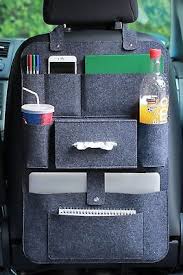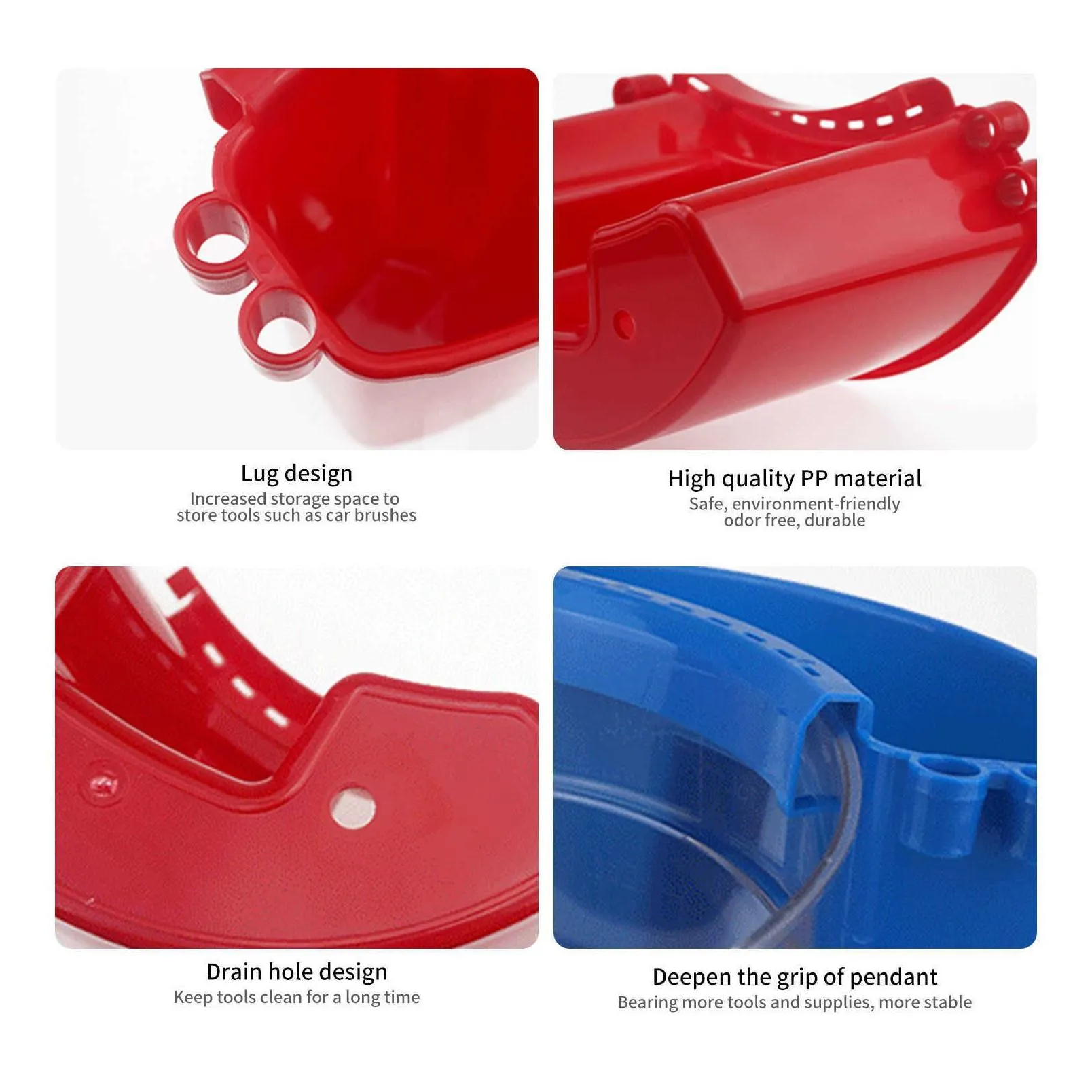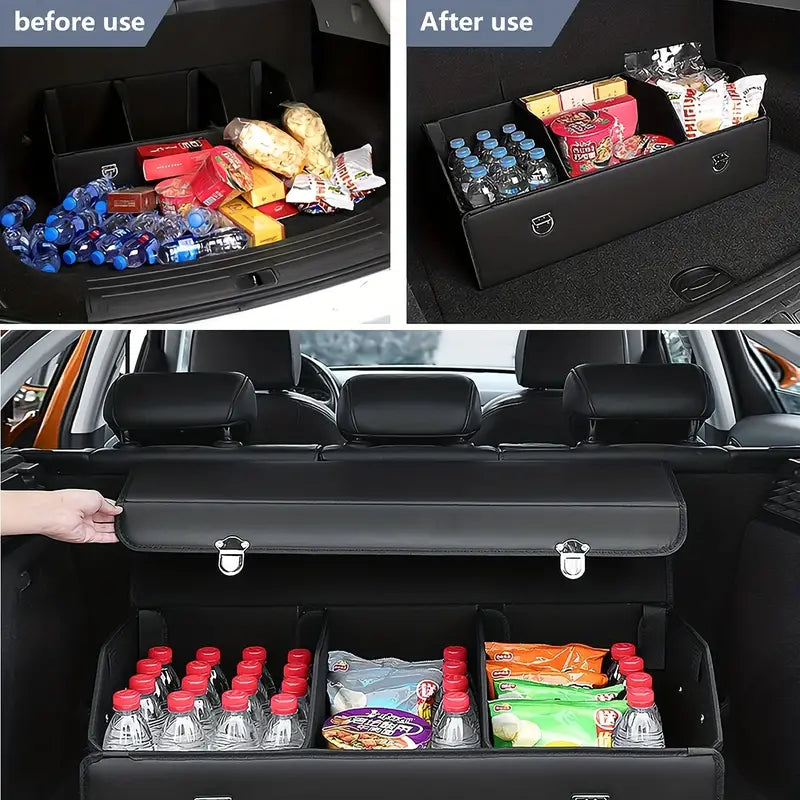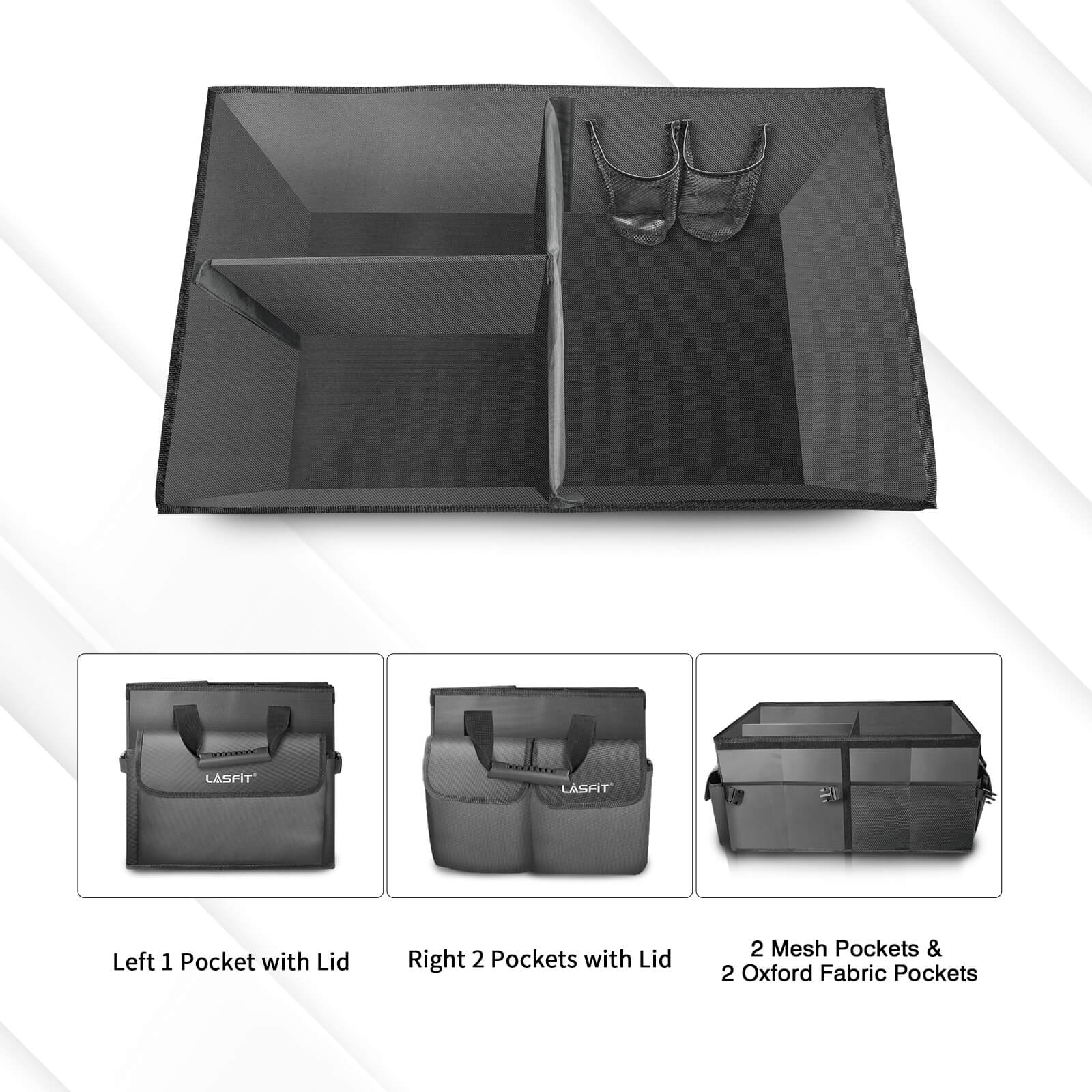A Voyage Towards Sustainable Car Interiors Eco-Friendly Car Organizer Materials
As we navigate through the complexities of modern life, our vehicles have evolved beyond mere transportation; they have become sanctuaries that embody our lifestyles, preferences, and values. As we strive for more eco-conscious living, it's only fitting that our cars reflect this commitment to sustainability. Among the various aspects of automotive care, car organization often takes a backseat in discussions about eco-friendliness. However, the materials used in car organizers can significantly impact both the environment and our driving experiences. In this article, we'll explore the world of eco-friendly car organizer materials, delving into their advantages, disadvantages, and how they contribute to a more sustainable lifestyle.
Eco-Friendly Car Organizers: A Greener Approach to Vehicle Organization

Organizing your vehicle doesn't just create a sense of order; it also enhances safety and efficiency during your travels. With increasing awareness of environmental issues, the demand for eco-friendly alternatives has surged in recent years. Traditional car organizers crafted from plastic or synthetic materials are falling out of favor as consumers seek out sustainable options that align with their values.
Choosing eco-friendly car organizers is not merely a trend; it reflects a conscious choice to reduce one’s ecological footprint. By opting for sustainable materials, drivers can tackle two challenges simultaneously—keeping their vehicles tidy while contributing positively to the planet. The evolution of car organizers mirrors broader shifts in consumer behavior and corporate responsibility, emphasizing a need for durability without compromising the environment.
Understanding the Shift Towards Sustainability
The shift towards eco-friendly car organizers stems from a growing recognition of the environmental repercussions associated with traditional materials. For decades, plastic dominated the landscape of automotive accessories due to its low cost and versatility. Yet, its long-lasting nature, while beneficial in some contexts, raises critical concerns regarding waste management and pollution.
Manufacturers and consumers are awakening to the potential of alternative materials that offer similar utility without the adverse effects on the environment. This transition embodies a broader cultural movement towards sustainability, wherein brands and consumers alike are reevaluating their choices and considering the lifecycle impacts of the products they use.
Emphasizing Minimalism and Practicality
In an age characterized by consumer excess, minimalism has emerged as a counterpoint, urging individuals to prioritize quality over quantity. Eco-friendly car organizers accommodate this ethos, promoting functionality with chic designs that integrate seamlessly into vehicle interiors.
With lesser emphasis on ostentation and more focus on practicality, these organizers allow users to maintain order without cluttering their space. From sleek bamboo trays to chic hemp pouches, eco-friendly options not only serve a purpose but also elevate aesthetic appeal. Therefore, embracing minimalism through sustainable choices enriches the overall driving experience.
Sustainable Materials for Car Organizers: From Recycled Plastic to Bamboo

Understanding the various sustainable materials that constitute eco-friendly car organizers can guide consumers towards informed choices. Each material brings its unique set of characteristics, allowing for diverse applications in organizing solutions. Here are some of the most notable materials making waves in this arena:
Recycled Plastic: The Second Chance Material
Recycling is at the heart of sustainability, and recycled plastic showcases this principle beautifully. Converting waste plastic into car organizers capitalizes on the durability of plastic while minimizing the environmental footprint.
Products made from recycled plastic not only divert waste from landfills but also consume fewer resources compared to virgin materials. They boast the same resilience against wear and tear, providing practical storage solutions like cup holders, bins, and seatback organizers that endure the rigors of daily use. Opting for recycled plastic reduces reliance on new plastic production, thus curbing greenhouse gas emissions and conserving energy.
Cork: Nature’s Versatile Gift
Cork is harvested from the bark of cork oak trees—a process that allows the trees to regrow and thrive. This responsible harvesting technique underscores cork's renewable nature, making it an attractive choice for eco-conscious consumers.
Cork's lightweight and water-resistant properties lend themselves well to car organizers, ensuring that they withstand spills and messes. Additionally, cork possesses natural thermal insulation, helping maintain a comfortable temperature inside the vehicle. Its attractive texture adds a touch of elegance, transforming simple organizers into decor that complements the car’s interior aesthetic.
Bamboo: The Fast-Growing Marvel
Bamboo has garnered attention as one of the most sustainable materials available, thanks to its rapid growth and regenerative capabilities. Unlike traditional lumber, bamboo reaches maturity within a few years and requires minimal water and no pesticides.
Bamboo offers a strong yet lightweight composition, perfect for producing durable organizers that stand up to the demands of everyday life. Its naturally antibacterial qualities add another layer of appeal, promoting cleanliness in confined spaces such as vehicles. As a bonus, bamboo’s earthy appearance connects drivers with nature, enhancing the overall sensory experience of travel.
The Benefits of Choosing Eco-Friendly Car Organizer Materials

Embracing eco-friendly materials for car organizers encompasses a range of benefits, both tangible and intangible. Beyond just personal preference, these materials contribute to a larger narrative of sustainability and responsibility.
Reducing Environmental Impact
One of the foremost advantages of choosing sustainable car organizers lies in their reduced environmental impact. Many eco-friendly materials, like bamboo and cork, are sourced sustainably and are biodegradable, meaning they break down naturally at the end of their life cycles.
This shift away from conventional plastics leads to a decrease in landfill waste and ocean pollution. Moreover, using recycled materials helps minimize the extraction of new resources, which further lessens the burden on the planet.
Promoting a Circular Economy
Choosing eco-friendly car organizers encourages a circular economy—a model focused on keeping resources in use for as long as possible. This contrasts sharply with the linear economy, where products are produced, consumed, and discarded.
By selecting materials that can be recycled, composted, or reused, consumers play a pivotal role in closing the loop. This approach fosters innovation among manufacturers to design products with longevity and end-of-life considerations in mind, ultimately leading to a more sustainable future.
Enhancing Personal Well-Being
Sustainability extends beyond the environment; it also encompasses personal well-being. When consumers choose eco-friendly materials, they feel empowered by their decisions and can cultivate a deeper connection with their belongings.
Surrounding ourselves with sustainable items can alleviate stress and promote mental clarity. Having organized, eco-friendly materials in a vehicle creates a serene driving environment that enhances emotional well-being. Thus, every small choice contributes to a holistic sense of self-care.
Top 5 Eco-Friendly Car Organizer Materials: A Comparative Guide

When navigating the plethora of materials available for eco-friendly car organizers, understanding their attributes and limitations is crucial. Below is a comparative guide to help you discern which materials might best suit your needs:
Recycled Plastic
Pros:
- Affordable and widely available
- Durable and resistant to damage
- Versatile for various applications
Cons:
- May still have a negative environmental impact if not adequately recycled
- Not biodegradable
Recycled plastic stands as a strong contender in the eco-friendly category due to its versatile applications and durability. However, its non-biodegradable nature means it remains in the environment for an extended period, even after recycling.
Cork
Pros:
- Renewable and biodegradable
- Lightweight and water-resistant
- Attractive natural aesthetics
Cons:
- Can be more expensive than synthetic alternatives
- Limited availability in some regions
Cork's alluring visual appeal and technical features position it as an excellent option for stylish organizers. Its premium price point may deter some consumers, but the benefits make it worthwhile.
Bamboo
Pros:
- Rapidly renewable resource
- Strong and lightweight
- Naturally antibacterial
Cons:
- Sensitive to water damage if untreated
- Limited color and design options
Bamboo shines in strength and sustainability. While it's prone to water damage, a simple treatment can enhance its durability. Consumers should ensure they select laminated options for added protection.
Hemp
Pros:
- Highly durable and strong
- Requires minimal water for cultivation
- Biodegradable
Cons:
- Limited color choices
- May require additional treatments for water resistance
Hemp proves its worth as a resilient material ideal for bags and pouches. While its limited aesthetic options may be off-putting for some, its environmental merits speak volumes.
Canvas
Pros:
- Durable and breathable
- Often made from organic materials
- Biodegradable
Cons:
- Can absorb moisture if untreated
- May wrinkle or fade over time
Canvas remains a classic favorite for its timeless appeal. Its organic composition aligns perfectly with eco-conscious values, though moisture exposure can lead to damage if not carefully maintained.
Where to Find Eco-Friendly Car Organizers: Online and Offline Resources

Finding eco-friendly car organizers involves exploring various avenues, both online and offline. As demand surges for sustainable alternatives, numerous sources now offer an array of products to cater to environmentally conscious consumers.
Online Marketplaces
Online platforms provide convenient access to a vast selection of eco-friendly car organizers. Websites like Amazon, Etsy, and specialized eco-friendly stores feature various options made from sustainable materials.
These platforms often include customer reviews, allowing shoppers to gauge product quality and performance. It’s essential to explore different sellers, comparing prices and materials to find the best match for your needs.
Local Eco-Friendly Stores
For those who prefer a hands-on shopping experience, local eco-friendly stores and boutiques can be treasure troves for sustainable car organizers. These retailers often curate collections featuring responsibly sourced materials, supporting local artisans and businesses.
Engaging directly with store owners also provides an opportunity to ask questions about product origins and eco-certifications, enriching the shopping experience and offering greater peace of mind.
Specialty Automotive Shops
Some automotive shops are recognizing the importance of sustainability and expanding their inventory to include eco-friendly accessories. By visiting specialty shops, consumers can discover unique organizers specifically designed for vehicles, combining functionality with environmental consciousness.
Additionally, many car manufacturers are beginning to roll out eco-friendly options in their accessory lines, so checking with your vehicle's manufacturer can yield exciting finds.
DIY Eco-Friendly Car Organizers: Upcycling and Repurposing Materials

For those with a creative flair, crafting your own eco-friendly car organizers can be a rewarding endeavor. Upcycling and repurposing materials not only saves money but also adds a personalized touch to your vehicle.
Upcycling Household Items
Repurposing household items to create car organizers exemplifies resourcefulness. Old shoe organizers, cereal boxes, or fabric remnants can transform into clever storage solutions.
For instance, an old basket can conveniently hold snacks, while jars can store smaller items like charging cables or change. This approach not only promotes sustainability but can also spark creativity, turning mundane objects into functional pieces of art.
Crafting with Natural Materials
Utilizing natural materials such as jute, twine, or fabric scraps enables individuals to embrace eco-friendliness in their projects. Handmade organizers can reflect personal style while embodying sustainable practices.
Consider sewing fabric pockets or creating a hanging organizer from burlap. These crafts serve dual purposes, beautifying the interior while providing ample storage without contributing to waste.
Engaging in Community Projects
Participating in community workshops focused on DIY projects can deepen connections with others who share similar values. These events foster collaboration and learning, allowing individuals to exchange ideas and techniques for crafting eco-friendly organizers.
By sharing skills and resources, communities can amplify the impact of sustainability initiatives, creating a ripple effect that extends beyond individual choices.
The Impact of Conventional Car Organizers on the Environment

To appreciate the benefits of eco-friendly car organizers fully, it's crucial to understand the detrimental impact of conventional organizers made from traditional materials.
The Life Cycle of Plastic
The journey of typical plastic car organizers begins with fossil fuel extraction, followed by energy-intensive manufacturing processes that produce carbon emissions. After their use, these items often end up in landfills, taking centuries to decompose. During this time, they leach toxins into soil and waterways, posing significant hazards to ecosystems.
Contribution to Ocean Pollution
Conventional plastic organizers often contribute to the global crisis of ocean pollution. Improper disposal practices lead to plastic waste entering marine environments, resulting in devastating consequences for wildlife and plant life. Marine animals ingest or become entangled in debris, hindering their survival, while microplastics infiltrate food chains.
Resource Depletion and Carbon Footprint
Beyond immediate pollution, the production of conventional car organizers depletes finite resources and amplifies carbon footprints. The extraction of petroleum for plastic manufacturing results in habitat destruction and biodiversity loss.
Adopting eco-friendly alternatives alleviates the demand for these damaging practices, fostering a more balanced relationship between consumption and environmental stewardship.
Making Informed Choices: Understanding Eco-Friendly Certifications

Navigating the landscape of eco-friendly products requires discernment. Understanding certifications associated with sustainable materials can help you make informed choices when selecting car organizers.
Recognizing Sustainable Labels
Familiarizing yourself with reputable eco-labels is essential for identifying truly sustainable products. Look for certifications such as Global Organic Textile Standard (GOTS), FSC (Forest Stewardship Council), and Cradle to Cradle.
Brands that carry these certifications typically adhere to strict guidelines regarding sourcing, manufacturing, and end-of-life considerations, ensuring that the products meet high environmental standards.
Investigating Brand Transparency
Transparency is key when evaluating the sustainability of a brand. Researching a company’s mission, sourcing practices, and supply chain can shed light on their commitment to eco-friendliness. Brands that openly share information about their environmental policies and practices signal a genuine dedication to sustainability.
Consumer Advocacy
As a consumer, advocating for eco-friendly practices within the industry can drive meaningful change. Supporting brands that prioritize ethical sourcing and transparent operations encourages other companies to follow suit. By choosing wisely, you empower businesses to invest in sustainable practices, propelling the market towards greener solutions.
Beyond the Materials: Sustainable Packaging and Manufacturing

While materials play a critical role in the sustainability of car organizers, packaging and manufacturing practices also contribute significantly to a product's overall ecological footprint.
Rethinking Packaging Solutions
Eco-friendly brands are increasingly adopting sustainable packaging solutions that reduce waste and environmental impact. Considerations such as recyclable, biodegradable, or compostable packaging materials reflect an overall commitment to sustainability.
Opting for products that come with minimal packaging or are packaged using recycled materials ensures that consumers are not just purchasing eco-friendly items but are also supporting sustainable practices throughout the supply chain.
Energy-Efficient Manufacturing Processes
The methods used to produce car organizers influence sustainability outcomes. Companies that prioritize energy-efficient production processes, reducing water usage and harmful emissions, contribute positively to the environment.
Inquiring about a brand’s manufacturing practices can empower consumers to make more informed choices. Brands that utilize renewable energy sources or engage in waste reduction strategies demonstrate a holistic approach to sustainability.
Accountability and Certifications in Manufacturing
Certifications like ISO 14001, which focuses on effective environmental management systems, indicate a brand's commitment to minimizing their environmental impact through continuous improvement.
Choosing products from certified brands signifies support for accountability in manufacturing, encouraging companies to uphold high environmental standards.
The Future of Eco-Friendly Car Organizers: Trends and Innovations

The pursuit of sustainability in car organizers is a dynamic field, with emerging trends and innovations reshaping the landscape. Staying abreast of these developments enables consumers to make forward-thinking choices.
Expansion of Sustainable Materials
As research advances, new sustainable materials are becoming viable options for car organizers. Innovations in bio-based plastics derived from plant materials may offer a promising alternative to traditional plastics.
Additionally, developments in composite materials that blend various sustainable elements could pave the way for enhanced durability and performance without compromising environmental integrity.
Smart Technology Integration
The integration of smart technology into car organizers represents a burgeoning trend. Eco-friendly materials can house cutting-edge technology, offering functionalities such as wireless charging stations or integrated sensors that assist with organization.
Through innovative designs, the future of car organizers will prioritize both sustainability and convenience, catering to the modern driver’s needs while respecting the planet.
Collaborative Efforts for Sustainability
The future of eco-friendly car organizers will likely see increased collaboration among manufacturers, designers, and sustainability advocates. Partnerships that emphasize shared goals for reducing environmental impact can lead to groundbreaking products that redefine consumer expectations.
Companies pooling resources and insights can foster industry-wide shifts, positioning sustainability as a norm rather than an exception. This collaborative spirit resonates with consumers seeking authenticity in their choices.
Conclusion
Embarking on the journey toward sustainable car interiors begins with a thoughtful exploration of eco-friendly car organizer materials. By replacing conventional plastic-laden accessories with innovative alternatives like recycled plastic, cork, bamboo, hemp, and canvas, consumers can actively contribute to a healthier planet.
As we make informed choices, we can align our car organization efforts with our values, cultivating a driving experience that harmonizes utility and environmental consciousness. Together, we can embrace a future where our vehicles reflect not only our personalities but also our commitment to preserving the beauty of our planet. Ultimately, the voyage toward sustainability is one we embark upon together—one eco-friendly car organizer at a time.



